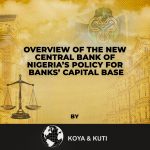INTRODUCTION
Nigeria is a Country with an estimated population of about 174,000,000 (One Hundred and Seventy Four Million) people, (2013, Nigerian Bureau of Statistics) and operates a presidential system of Government. There are 36 (Thirty-Six) States, 774 (Seven Hundred and Seventy-Four) Local Government and the Federal Capital Territory. The legal system is largely a hold-over from the colonial English legal system with a framework of Statutory laws and enactments codified into what is now known as the Laws of the Federation of Nigeria 2004.
In March 2017 the Federal Government of Nigeria (“FGN”) launched an economic Road Map titled “The Economic Recovery and Growth Plan” (ERGP) which is directed at the restoration of growth, human development and a globally competitive economy. Following the implementation of the ERGP, Nigeria has returned to economic growth and in the recent World Bank Ease of Doing Business Report 2017, the Country was recognized as one of the 10 (ten) best improved economies in the world in 2017. Recently the FGN also signed into law the Credit Reporting Act 2017 which seeks to provide credit information relating to credit worthiness, credit standing or capacity. Some of the objectives of the Act include facilitating and promoting access to credit, promoting responsibility in the credit market, enhancing risk management in credit transactions. The Act also provides guidelines for licencing credit bureaus including terms and conditions for suspension and revocation of the license.
Substantial business opportunities abound in the following sectors of the economy i.e. Real Estate, Infrastructure (Road and Transport), Energy/Hydrocarbon deposits, Mining, Agriculture, Food/Consumer goods and Manufacturing.
Doing business in Nigeria is primarily regulated by the Companies and Allied Matters Act (“the Act”), which is the law governing the formation and regulation of business enterprises in Nigeria, anyone (whether local or foreign) intending to carry on business in Nigeria is mandated to register the business with the Corporate Affairs Commission (“CAC”), the body responsible for the registration and regulation of corporate entities in Nigeria. Other regulations associated to the Act are the Companies Procedure Rules 1992 and the Companies Winding Up Rules 2001.
1.0 BUSINESS MODELS
Business activities can be commenced in Nigeria using any of the underlisted structures:
• Sole Proprietorship/Business Name
• Company limited by Guarantee
• Private or Public Limited Liability Company
• Unlimited Liability Company
• Incorporated Trustees
• Representative Office
Though the Act mandates a foreigner to incorporate a local Company, or branch, or subsidiary of an existing company before commencing business operations in Nigeria, Companies engaged by the Federal Government to execute specific projects, companies undertaking approved loan projects on behalf of donor countries or international organizations and foreign government owned companies engaged wholly in export promotion activities are exempted from the general rule. However, it is pertinent to note that these exemptions which are granted for a fixed period (usually three years) are hardly renewed and may be revoked by the Federal Executive Council which is the body comprising the President, the Vice President and the Ministers in Council formulating policies and running the executive arm of the Federal Government. Consequently, Foreign Investors envisioning a long-term existence in Nigeria are advised to incorporate a local entity.
Generally, the simplicity of running the private limited company makes it the most common form of registering a business in Nigeria.
2.0 REGULATORY APPROVALS
2.1 Certificate of Capital Importations
Foreign investment in Nigeria is primarily regulated by the Foreign Exchange (Monitoring and Miscellaneous Provisions) Act, Cap F34 (the “Forex Act”), Laws of the Federation of Nigeria 2004.
The Forex Act allows the importation of foreign currency for the purposes of investment in any enterprise provided the same is imported through an Authorized Dealer i.e. any duly licensed bank or other financial institution.
A foreign investment in the Nigerian economy will be granted approved status (a recognition that the original investment came into the country from abroad in the form of equity or loans by way of cash and/or parts, equipment and machinery) for the original investment in order to ensure future unimpeded repatriation of the capital, dividend, expatriate personal home remittance of wages, etc. This is evidenced by a Certificate of Capital Importation (“CCI”) issued to the Investor by the Authorized Dealer.
2.2 NIPC Registration
The Nigerian Investment Promotion Commission (“NIPC”) Act permits a foreigner to own up to 100% (One Hundred per cent) of any business enterprise except enterprises on the “negative” list of the Act i.e. enterprises involved in the production of and dealing in arms, ammunition, narcotic drugs and psychotropic substances.
The Act mandates any enterprise with foreign participation to register with the Nigerian Investment Promotion Commission.
2.3 Business Permit
A Business Permit is the authorization for local businesses with foreign investments (where foreign interest has majority shares) to start business in Nigeria. Business permit applies to wholly foreign company or professional intending to set up business or take over existing one wholly or practice a certain profession.
2.4 Expatriate Quotas
An Expatriate Quota is the official permit to a company conveying permission for the company to employ expatriates to specifically approved job designations and also specifying the permissible duration of such employment.
The minimum authorized share capital advisable to qualify for the applicable approvals for a Company with foreign shareholders is 10,000,000.00 (Ten Million) ordinary shares of N1.00 each as the relevant agencies have by convention set the minimum as such. Additionally, a share capital of 10,000,000.00 (Ten Million) ordinary shares has the benefit of attracting two (2) automatic expatriate quota positions while a share capital of 20,000,000.00 (Twenty Million) ordinary shares guarantee four (4) expatriate quota positions.
2.5 CERPAC
Every non-Nigerian who enters Nigeria legally and who wishes to reside/work in Nigeria must make an application for a Combined Expatriate Residence and Alien’s Card (CERPAC). The CERPAC is made up of two cards; the Aliens Registration Card and the Residence Permit. While the Residence Permit allows the employee to live and work in Nigeria, the Alien’s Registration Card is a record of the expatriate’s movements. The CERPAC is valid for two years and renewable thereafter.
3.0 FREE TRADE ZONES (FTZs)
FTZs are designed to attract Foreign Direct Investment. Foreign Investors can set up businesses directly in FTZs without necessarily incorporating a company as earlier indicated. Registered companies are also eligible to register separately and operate in an FTZ. Such registered FTZ entity will have a suffix FTZ at the end of its name.
Companies in the FTZs enjoy various incentives including the following;
A complete tax holiday from all federal, state and local government taxes, rates, customs duties and levies
One-stop approvals for all permits, operating licenses and incorporation papers
Duty-free, tax free import of raw materials and components for goods destined for re-export
Duty-free introduction of capital goods, consumer goods, machinery, equipment and furniture
Permission to sell 100% (One Hundred per cent) of manufactured, assembled or imported goods into the domestic Nigerian Market
Goods manufactured in the FTZ sold into the domestic market shall attract import duty calculated only on the basis of the value of the raw materials or components used in assembly not on the finished products
100% (One Hundred per cent) foreign ownership of investments
100% (One Hundred per cent) repatriation of capital, profits and dividends
Waiver of all import and export licenses
Waiver on all expatriate quotas (for companies operating in the zones)
Prohibition of strikes and lockouts
Rent moratorium on land at the construction stage within the zone.
4.0 TAXATION
Taxes are imposed by the Federal, State and Local Governments. The Federal Board of Inland Revenue (“FBIR”) administers Federal Taxes through the Federal Inland Revenue Services (“FIRS”), State taxes are administered by the Internal Revenue Boards of the various taxes while the various councils administer local Government Taxes.
Some of the taxes imposed on Companies doing business in Nigeria are as follows:
Withholding Tax (WHT)
Companies Income Tax (CIT)
Personal Income Tax (PIT)
Value Added Tax (VAT)
Other Taxes including luxury taxes, cabotage levy, Nigerian Content Development levy, Nigerian Communications Commission levy.
5.0 NOTAP REGISTRATION
The National Office for Technology Acquisition and Promotion Act mandates that any agreement under which a foreigner is to provide technology, management or assistance to a Nigerian entrepreneur must be approved and registered with the National Office for Technology Acquisition and Promotion (“NOTAP”). The Fees payable for the provision of such services must also be approved by the NOTAP.
Non-registration with NOTAP impedes the repatriation of any income due to the Foreign Partner (e.g. fees, dividends, royalties etc) where such payments are to be made in foreign currency.
6.0 LABOUR LAWS
The administration of labour in Nigeria is regulated by the Labour Act Cap. L1 Laws of the Federation of Nigeria 2004, the Workmen’s Compensation Act Cap. W6 Laws of the Federation of Nigeria 2004, the Trade Dispute Act Cap T8 Laws of the Federation of Nigeria and the Pension Reform Act 2014.
For more information about how the Koya & Kuti Solicitors can assist with doing business in Nigeria please contact Olujide Kuti on +234 803 331 6963 or email olujidekuti@koyakutisolicitors.com
The contents of this article are intended for general information purposes only and shall not be deemed to be, or constitute legal advice. We cannot accept responsibility for any loss as a result of acts or omissions taken in respect of this article


